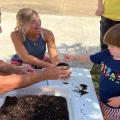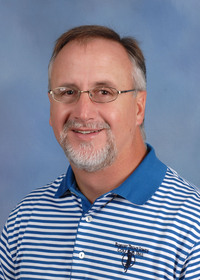History of the MS Master Gardener Program
The following is a reprint of Master Gardener International Fact Sheet 95-01, July 1995. Master Gardener International, P. O. Box 526, Fall Church, VA 22040-0526.
The first Master Gardener program began in Washington State, in King and Pierce counties, in 1972. Dr. David Gibby, the Extension agent for horticulture in those counties, was overwhelmed by the volume of requests for information about gardening coming into his office. His efforts to use the media to answer questions more efficiently only seemed to result in an increasing number of telephone calls asking for individualized information. Gibby thought of finding gardeners who would be able and willing to answer the public's questions, and came up with the idea of trading specialized training in horticulture for a commitment to spend a specified number of hours doing volunteer outreach work. He sought and obtained the help of Extension agents, specialists, and administrators at the state university in planning and testing both a training program for volunteers and a format for plant clinics at which they would provide information to the public.
The first Master Gardener group to be trained by Extension specialists was from King and Pierce counties. Gardeners were eager to enroll in the program; more than 300 people applied to take the first class, and 120 were enrolled in the session which began in 1973. It was soon followed by a similar training program in Spokane County. Sites for plant clinics were then arranged, schedules worked out, and master gardeners began working with the public. During their first year of operation, these master gardeners served more than 7,000 clients. Twenty-three years later, Master Gardener programs have spread dramatically. Programs have been in operation in 45 states, the District of Columbia, and four Canadian provinces. In addition to the plant clinics, begun by the first group and now a basic activity of many others, Master Gardeners have undertaken a wide variety of other projects. They staff horticulture hotlines, coordinate environmental and planting projects, run demonstration gardens, do research, manage some existing public gardens, work with school groups and other special populations, publish newsletters, and broadcast radio and television programs as some of their many activities. Just as the projects of different groups vary, so do their training programs and organizations. Most programs are run on a local basis, but some are a cooperative venture on the part of several jurisdictions, and some are unitary statewide programs. The length of the training also varies -- from 30 hours to 120 hours -- and some programs offer advanced training sessions. The cost of different programs varies too, depending on local budgets and expenses. As a result of budget cuts in recent years, some programs have been curtailed or even suspended -- to the great regret of those involved and of the interested public as well.
As master gardening has expanded, so too have the organizations which maintain connections among those in one training area, within states and regions, and across countries. There are now nearly 700 active training programs, of which more than half have links to some ongoing association. However, of the estimated 50,000 master gardeners who have completed a training program, only a small fraction remain active volunteers and in touch with their local organizations. Some, to be sure, have moved to areas where there is no group available for them to join, or are taking a break from volunteer activities while maintaining their own gardens and perhaps influencing their neighbors.
In any event, the public eagerness for information has not slackened. Just as the response to notices about the first master gardener program far exceeded the number of places available, public expressions of interest in master gardening are large and impressive whenever information about the program(s) is made available.
For information about Master Gardening programs near you, contact your county Cooperative Extension Office in the U.S. or the Canadian Ministry of Agriculture.
[MGI is a nonprofit, charitable, educational and scientific organization established to support and promote Master Gardening programs internationally through information exchange, program support, specialized publications, and media outreach. Support is coordinated with local, state, and regional Master Gardening groups, the USDA Cooperative Extension Service in the U.S. and the Ministry of Agriculture in Canada, other national and international organizations, educational groups, and representatives of the horticultural industry.]
Publications
News
Garden enthusiasts of all ages are welcome Oct. 21 to Fall Garden Day at the North Mississippi Research and Extension Center in Verona. The event will be held from 9 a.m. to 2 p.m. at the Mississippi State University facility.
STARKVILLE, Miss. – Dates have been set for the fall 2023 slate of Master Gardener courses.
RAYMOND, Miss. -- Six years ago, John Malanchak combined his love of science, passion for teaching and a call to serve others into a project he named Dominic’s Garden. The project, which serves people with disabilities in the Jackson metro area, was recognized in June with an award at the International Master Gardener Conference in Overland Park, Kansas.
Success Stories
Susie Harmon laughs when she relates her granddaughter’s observation of her favorite pastime.
Paul Cavanaugh became a Master Gardener when he came off the road as a truck driver and his wife encouraged him to find a hobby.
The Mississippi State University Extension Service recently relaunched its Nurturing Homes Initiative. The program’s mission is to improve the quality of the early educational experiences provided in family childcare homes through mentoring, improving the learning environment, and delivering research-based information.






